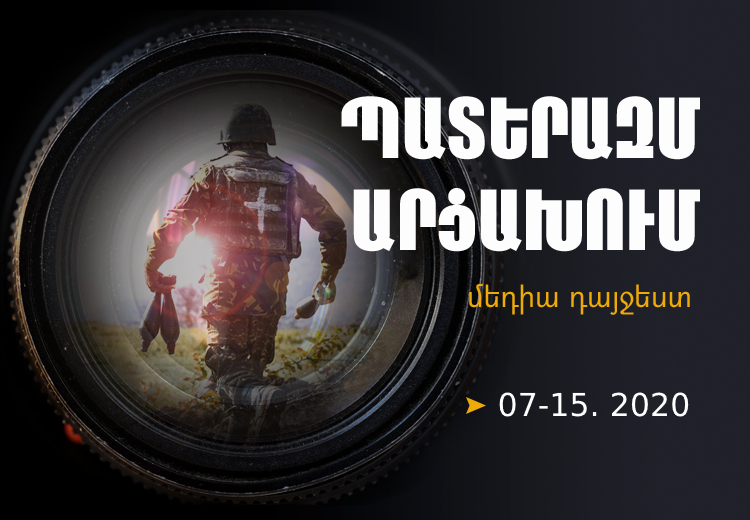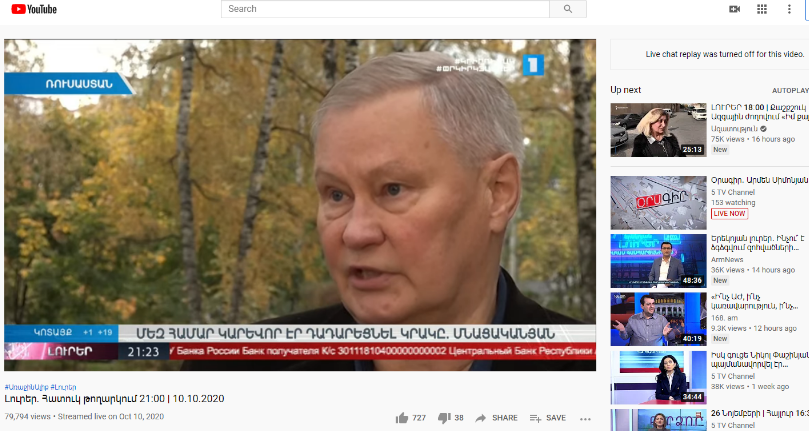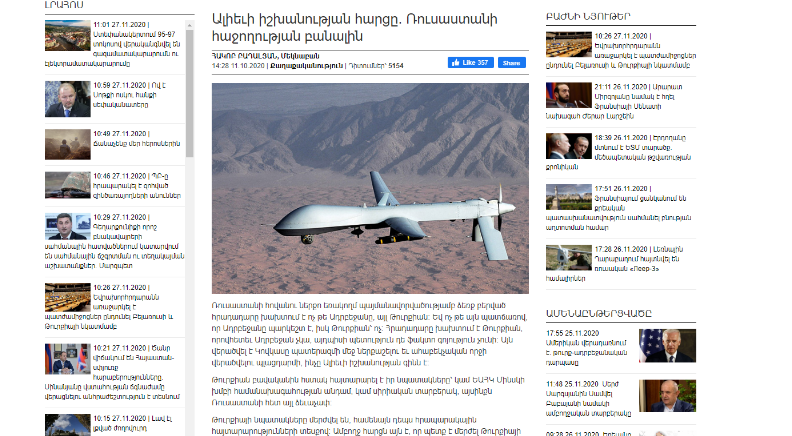
The large-scale military operations against Artsakh on September 27 are already in the past, but the war and its aftermath are one of the most discussed topics in the Armenian media.
Media.am previously referred to the first ten days of the war, and this time the focus is on the most discussed topic of the second week of October, the first Russian-brokered ceasefire.
On October 10, after midnight, after more than 10 hours of Russian-mediated talks between the Foreign Ministers of Armenia and Azerbaijan, a humanitarian ceasefire was announced on the line of contact from 12:00 on the same day.
Russian Foreign Minister Sergei Lavrov issued a joint trilateral statement, stating in particular that a ceasefire will be declared for humanitarian purposes on October 10 at 12:00 for the exchange of other prisoners of war and the bodies of the victims through the mediation of the International Committee of the Red Cross and according to the criteria.
Only 5 minutes after the ceasefire, Defense Ministry spokeswoman Shushan Stepanyan announced that “Azerbaijani units attacked the area called ‘Karakhambeyli’ at 12:05 pm, and Artsakh Defense Army units took appropriate measures to stop the enemy’s attack.”
This was followed by numerous official announcements about the violation of the ceasefire and the need to maintain the ceasefire. The Office of the Human Rights Defender of the Artsakh Republic informed that within the framework of the fact-finding mission, it was found out that at least 5 civilians of Artsakh were killed by the Azerbaijani armed forces after the ceasefire agreement came into force on October 10 at 12:00.
Zara Amatuni, Head of Communication Programs at the International Committee of the Red Cross (ICRC) Armenia Office, also mentioned, “The International Committee of the Red Cross (ICRC) will not engage in humanitarian action in such a situation, as the humanitarian ceasefire must be fully maintained, which in turn will ensure the safety of our teams working there. We see publications about the shelling from both sides.” Amatuni added that, naturally, such a situation does not allow for starting actions. Such conditions are not satisfactory.
In addition to official announcements, there were separate comments from the media.
“Channel 5,” for example, during its news program that day, quoted the humor conveyed by the Artsakh correspondent that the discussion of the ceasefire had lasted much longer than the ceasefire itself.
A few days later, during another broadcast, a reportage was prepared from a shelter in Stepanakert, in which the journalist states that “the residents of the shelter are not surprised by the actions of the enemy, they know very well what the Azerbaijanis are capable of.” Then, the opinion of one of the residents is quoted, “There was no ceasefire. They fired constantly, even after the agreement. We are not even trying to get out of this basement, you never know when they will strike.”
In another issue of “Haylur,” the conversation with the Russian State Duma deputy Konstantin Zatulin was presented, where he stated that the CSTO can become one of the factors of the peacekeeping mission.
According to him, the humanitarian ceasefire did not work, because the parties did not agree to introduce verification, investigation mechanisms, “that is why military observers are needed at the border, and Russian observers themselves.”
“Russian peacekeepers have never been in the role of escalating the war situation, while the situation may worsen if, for example, Turkish peacekeepers carry out a peacekeeping mission. Russia is in favor of peace, Turkey is in favor of war,” he said, adding that those who want peace will prefer Russian peacekeepers.
During the second week of October, the opinions of Russian officials and experts were not small, and the same opinions could be found in different media. One of them was the opinion of Konstantin Kosachev, the head of the International Affairs Committee of the Federal Council of the RF Federal Assembly. “The main thing happened: The closed circle of mutual violence was broken. There is a possibility of a ceasefire, if not peace. It’s better than nothing. The provocateurs, if they reappear, will eventually shoot their own people, captives and those killed. And they need to know about it. That is why they should not be on either side. “
“The fact that the bloodshed was stopped after 10 hours of difficult consultations is beyond praise. There is no need for that, however. “A lot of work has been done,” Kosachev added.
Kosachev’s opinion was published by 1in.am and Iravunk newspaper.

The opinion of Russian military expert Mikhail Khodaryonok also appeared on Public TV. He noted that Azerbaijan did not achieve its military-political goal at this stage of the offensive, but this does not mean that peace has been established. “Azerbaijan will not back down from its expansionist actions in the near future. I suppose that the ammunition of both sides is about to be consumed, the long war is not favorable for the parties.” He added that at this stage the international community can only condemn the inclusion of terrorist groups in the Azerbaijani army, but “it is a war and only judgments are not enough.”
In “Perspective” Aram Abrahamyan talked to Russian political scientist Vitaly Tretyakov. In his opinion, Russia is the most influential superpower in the region, which is the most interested in establishing peace.
“Turkey’s establishment in the South Caucasus is in no way favorable to Russia. The formation of a third powerful force here will lead to destabilization, therefore Russia can not allow Turkey to strengthen in this region.
Interesting analyses were found in “Lragir.” In one of the articles entitled “This ceasefire is not a truce and it never can be” the author states that this ceasefire reached in Russia is primarily addressed to the Russian side.
“During the ceasefire, Russian state institutions will either be able to remove international terrorism from their borders, carry out changes of power, particularly in Azerbaijan, or Russia will leave the region once and for all, leaving it in a state of chaos.”
In his article, the author of the website Hakob Badalyan mentions that the ceasefire reached under a trilateral agreement under the auspices of Russia is violated not by Azerbaijan, but by Turkey. “And not because Azerbaijan is decent and Turkey is not. Turkey is violating the ceasefire because there is no Azerbaijan, there is no de facto such state. It has become a platform to plunge the Caucasus into war, to become a terrorist lair, which is the price of Aliyev’s rule.”

“Turkey has quite clearly stated its goals, either as a member of the OSCE Minsk Group Co-Chair or as a Syrian option, that is, a different dimension with Russia,” the author added.
“… Russian President Putin stated that Russia will not allow large-scale military operations in the direction of the Armenian border. The point, however, is that Turkey’s ‘bet’ is the Azerbaijani platform; it must be restrained in that direction. And here Russia and practically all the other power centers involved, except France, keep parity. “It may not be so in real politics, but they are fighting with Turkey, particularly Iran and Russia, for the ‘Azerbaijan’ platform.”
In the “168 Hours” article “One should not have the illusion that Azerbaijan will keep the ceasefire,” Azerbaijani expert Angela Elibegova thinks that “in any case, it should be understood that Azerbaijan will violate, will go to provocations, will try to accuse the Armenian side of violations. You have to be ready for that.”
In one of its programs, ArmNews spoke with Tevan Poghosyan, head of the International Center for Human Development, who, speaking about the ceasefire agreement, noted the need to impose sanctions in the case of violations, emphasizing that “Azerbaijan has violated two of the four points of the document.”
Haykakan Zhamanak spoke with Public Council member Styopa Safaryan, who mentioned four reasons for Azerbaijan’s violation of the ceasefire agreement, one of which, according to him, is that Aliyev does not want to return to the negotiating table, “he closed that subject before the war.”
About a week before October 18, when a second ceasefire agreement was reached through the mediation of France, the other co-chair of the OSCE Minsk Group, and a statement was issued, the Armenian media focused on the need for a humanitarian ceasefire, linking it to the removal of corpses. In this context, the official view of Armenia was mainly circulating, according to which the Azerbaijani government and military-political leadership are afraid to face the public with the losses suffered on the battlefield.
Anahit Danielyan


Add new comment
Comments by Media.am readers become public after moderation. We urge our readers not to leave anonymous comments. It’s always nice to know with whom one is speaking.
We do not publish comments that contain profanities, non-normative lexicon, personal attacks or threats. We do not publish comments that spread hate.